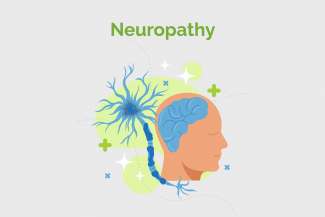Neuropathy (also known as Peripheral neuropathy) is a condition wherein the nerves of the body are damaged (from injury or disease) and thus fail to function normally. This affects the communication between the nerves and the brain. It is a fairly common condition and can affect people of all ages. It is however, more common in men and the elderly, and those with a family history of inherited neuropathy.

Types and Complications of Neuropathy
There are numerous types of neuropathies identified, based on the types of nerves damaged. There are 3 types of nerve fibers that can be affected and most doctors will use these terms to describe the diagnosis:
- Motor: these are nerves that control muscle movement e.g. walking, talking, holding etc.
- Sensory: these are nerves that transmit sensations e.g. pain, touch, temperature etc.
- Autonomic: these are nerves responsible for regulating unconscious functions e.g. breathing, digesting, workings of the heart and glands etc.
Complications
If the neuropathy is left untreated, patients can be at a higher risk for further complications which are often irreversible. These include:
- Foot ulcers and sores if gone unnoticed may become infected. This is a major concern for Diabetic patients. Infected ulcers may in turn lead to gangrene.Gangrene means death of tissue. It results from damaged and blocked blood and nerve supply around the ulcer. Amputation is the only treatment for gangrenous tissue.
- Hypoglycemia unawareness is another dangerous complication for people with Diabetes. It is the inability to feel signs of low sugar (below 70 mg/dl) such as trembling, sweating, palpitations etc. Failing to feel and recognize hypoglycemia can lead to coma and even death.
- Pacemaker for the heart may be required once the cardiovascular autonomic system fails.
- Charcot Joint or neuropathy arthropathy is progressive degeneration of the foot due to nerve damage. Usually, the foot is seen to become red, swollen, warm with no other sensation, painful (in early stages) and unable to bear weight. It may even become deformed over time.
Changed
01/Feb/2020
Community
Condition










